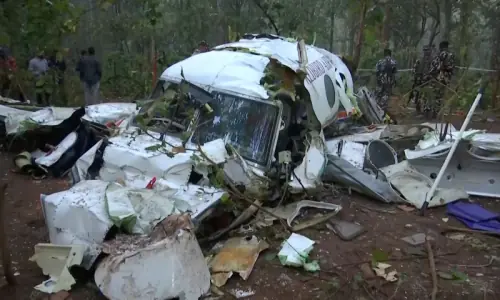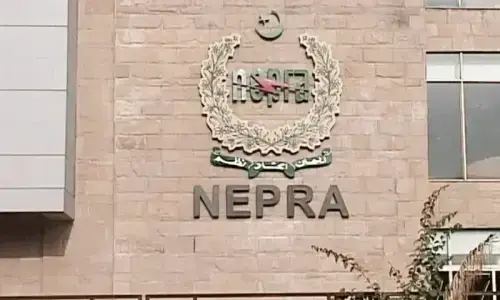
PAKISTAN could be water scarce by 2025. In recent days, this prediction has generated headlines and galvanised social media users across the country. It’s not the first time we’ve heard this estimate. The UN, Pakistan’s Met department and the Pakistan Council of Research in Water Resources have all delivered it in recent years.
The fact that the projection didn’t attract much attention previously is unsurprising. For years, Pakistan’s water researchers have shouted from the rooftops about water insecurity. And most people couldn’t be bothered to look up to see what the shouting was about. But today, perhaps because of the debate on the Kishanganga dispute, Pakistan’s water woes are getting attention. That’s a good thing, given the seriousness of the situation. Pakistan won’t become water scarce in 2025 because, for all intents and purposes, it’s already water scarce.
Per capita availability hovers around 1,000 cubic metres, the scarcity threshold. In some areas, the Indus has been reduced to a puddle, bringing misery to farmers and an agricultural sector that dominates the economy. Drought conditions are endemic in Balochistan. According to officials in Karachi, residents receive fewer than 500 million gallons of water per day, well below 50 per cent of daily needs.
Meanwhile, groundwater tables are plummeting. According to the World Wide Fund for Nature in Pakistan, the water table has fallen to below 130 feet (39.6 metres) in central Lahore. The Indus basin aquifer, as revealed by Nasa satellite data, is the second most stressed in the world.
Building new dams won’t make damaging policies go away.
Groundwater is water security’s safety net. And in Pakistan, this safety net is fraying rapidly. It is also increasingly contaminated.
Let’s be clear: Pakistan is rapidly running out of water, and much of what’s left is unfit for consumption. The over 53,000 children that die every year from waterborne disease, according to Unicef, learn this in the most tragic way. More than two-thirds of Pakistan’s households drink contaminated water, according to Unicef. Research in Science Advances journal finds that, based on about 1,200 groundwater samples, up to 60 million people, more than a quarter of the population, are at risk of consuming arsenic. A whopping 91pc of Karachi’s water, according to a Pakistani judicial commission report, contains sewage and industrial waste.
Water pollution isn’t just a public health hazard, it’s also detrimental to the economy. According to the World Bank, it costs Pakistan nearly 4pc of GDP.
With scarcity having arrived, there’s only so much that can be done. Indeed, the what-should-be-done question has become the can-anything-be-done question.
Fortunately, the answer is yes. The first step is to craft a national consensus, with buy-in from the entire political class, for addressing a long-neglected crisis. A new national water policy, approved last month, is a good start. It needs a strong implementing framework and should be informed by inputs from Pakistan’s water experts.
Tough decisions will need to be made about changing the public policies that have exacerbated water woes: a preference for wasteful flood irrigation and water-guzzling crops, a lackadaisical approach to maintaining and repairing ageing, leaky water infrastructure; a paucity of wastewater treatment facilities, and a distorted water-pricing regime that gives consumers little incentive to conserve. Let’s also not forget that CPEC, with its large-scale projects in Pakistan’s most parched regions, is an accelerant of water stress.
Building new dams — or getting a favourable decision on the Kishanganga dispute — won’t make these damaging policies go away. Admittedly, an American urging Pakistan to develop political consensus to tackle a critical policy dilemma may be a case of the pot calling the kettle black. In America, partisan gridlock has long stymied efforts to address poor healthcare and gun violence.
Yes, it’s hard to develop political consensus and national strategies. But it’s essential. For Pakistan, the alternative is stark: a dry dystopia where some, equipped with electric tube wells, desperately search for the last drops of groundwater, while others find themselves at the mercy of rapacious water mafias. Energy resources are exhausted. Public health crises explode. Water scarcity takes a devastating toll, killing crops, livelihoods, economic growth, and, slowly, the nation on the whole.
Back in 2007, South Asia scholar Anatol Lieven had warned that water shortages pose “the greatest threat to the viability of Pakistan as a state and a society”. At the time, his warning may have seemed hyperbolic.
Today, with the existential threat posed by water stress coming into sharp focus, Lieven’s warning is sounding remarkably prophetic.
The writer is deputy director for the Asia Programme and senior associate for South Asia with the Woodrow Wilson International Centre in Washington, D.C.
michael.kugelman@wilsoncenter.org
Twitter: @michaelkugelman
Published in Dawn, June 19th, 2018






























